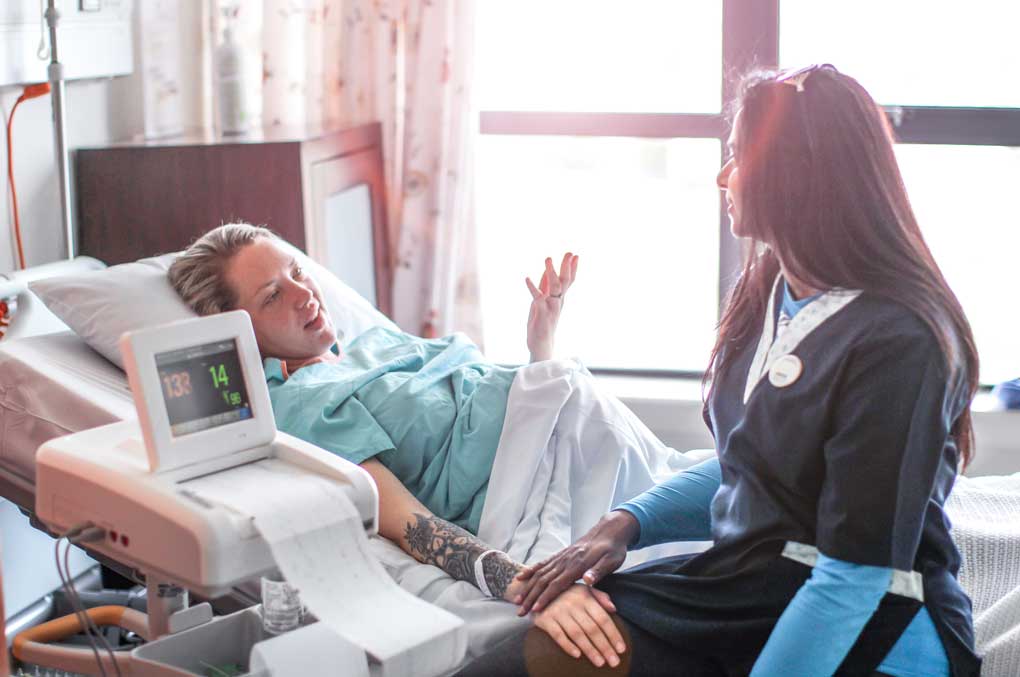Here at ParentData, I write about data and evidence, with the hope that sometimes these conversations will lead to change. I’ve written a number of times — both here and in my books — about the data on doulas, and how strong the evidence is to support their value. That evidence is so strong that, I think, it should be a policy focus.
Actually making that policy, though, is hard. Which is why I’m glad we have people like today’s guest, New York State Senator Samra Brouk, to do the on-the-ground work. Senator Brouk spearheaded an effort in New York to get doula services covered by Medicaid (which they now are, as of January 2024!). We talk today about our mutual love of data, why doulas are important for maternal health, especially for Black women, and how to convince your older colleagues that these issues matter.
Senator Brouk is a kindred spirit. This conversation was incredibly fun for me, and I hope you enjoy it.
To spark your interest, here are three highlights from the conversation:
Why did you choose to have a doula for your birth?
And for so many Black women like me, instead of worrying about the colors in the nursery and what kind of crib and what kind of cute nursing tops we want to buy, we are faced with the fact that in New York State, no matter how much money, how much education you have, it doesn’t matter. We are still five times more likely to die in childbirth.
So I think a lot of people understand maternal mortality is bad in the U.S. It is worse for Black and brown women, and so here I am, a legislator working on these policies in my day job, tremendously fearful every night when I’m thinking about how I’m going to go through the process.
How do you stay motivated in your policy work?
And so I can say this, as I still consider myself somewhat of an outsider, right? Because I spent more time doing other things in my career than I have in this part of my public career. So I still think like that too, and I remember being faced with those questions. And to be very frank, a lot of those questions came up in last year’s budget in New York where I nearly changed my middle name to “doula.” Because every room I was in, I mean I won’t say I was yelling, but I was speaking very sternly and assertively and sharing my data points and making sure that people understood how important these policies were and how important this funding was. And one of the things I’ll say is that I think that it is easier to ignore this topic when you don’t have a new mom, Black woman legislator in the room fighting for it.
You couldn’t tell me it wasn’t worth it, you couldn’t tell me that it doesn’t work, because I had experienced what some of these interventions can do to promote healthier outcomes for me and my daughter. So I mean, none of it comes easy, definitely, and it’s always a tradeoff when it comes to policy and obviously budget decisions. But I think we have to always consider: where have we historically ignored and where have we historically not funded and thought about the outcomes for certain people? Because we have a lot to make up for, and I think about that a lot. I have 10, 20 years to make up for when it comes to maternal mortality and especially when it comes to Black maternal mortality.
What does your legislation do and how did you pass it?
There is a cost-effective argument for doulas to be covered by Medicaid, which is that if you reduce the C-section [rate], if you reduce the time in the hospital, that time is very expensive. And so actually, in principle, you might well break better than even — you might make money by paying for everybody to have a doula. It’s free money. Free money is so rare.
So tell me about your legislation.
So we started with that work group. We held a hearing on doula care and what it would look like to be statewide. And as part of that advocacy grew, it really became a priority item for the state senate, probably because I was educating everyone on what doulas were. But then also the governor took notice as well — took notice and really created it as a priority of her own.
And so starting this year, January 1st, 2024, we finally have statewide Medicaid reimbursement for doulas. And that, we hope, is going to make a huge difference, obviously, for birthing people.
Full transcript
This transcript was automatically generated and may contain small errors.
When my daughter was born, when I was in labor I had two people in the room most of the time, my husband and my doula Melina and if I had had to pick one it would not have been close. At some point my husband, who I want to be clear is a wonderful person, left to eat a bagel because it was covered in onions and he needed a break and was hungry. Melina did not take a break, she didn’t go eat a smelly bagel. She sat in the shower with me and sprayed my back with warm water, she had me move into different positions, she encouraged me to push in different ways. And she was there when the baby came out after two and a half hours of pushing, which I definitely would not have been able to do without her support. She was there before the birth to help us get prepared and she came afterwards, she was one of the first people when we got home to come and tell me that in fact yes, the baby was swallowing and I could stop freaking out quite so much.
I had a doula because the evidence said that it was a good idea and this is a place where both my own experience anecdotally and the data really lines up. There’s a tremendous amount of randomized trial evidence of other information that tells us that doulas can improve birth outcomes, they can improve birth outcomes especially for vulnerable groups. I have tried shouting many times from the rooftops, “Hey. Everyone should have a doula, it’s cost-effective. It would improve people’s lives. Hey. People. Doulas.”
But one of the things about being a writer is that you just write this and you hope people read it, you hope people do something about it. My guest today is one of those people who is actually doing things about this.
Senator Samra Brouk, I am so thrilled that you’re joining me. Thank you so much for being here.
And I remember seeing this graph and it had the US at the very top for maternal mortality, which is a bad thing. Right? That we have such a high rate of maternal mortality and I kid you not, I believed so deeply and wholeheartedly in our health care system here in the US that I assumed this woman had the graph wrong. I assumed she had accidentally inverted it and I said, that has to be impossible and so I remember from that first shock that I had at this point that was over 10 years ago. To now being in a position where I’m digging deeper into it, not just on a national level but in a state level and then in a local level as well and just realizing that this is something that’s not getting better. And so I may be biased, I came into office because I’m trying to change so many of these things. So I do believe that through policy decisions, we can write the ship on these things and we have seen very modest improvements based on policies that we make.
And so when you ask the question, right? How do we change this? We’ll get into more detailed reasons or ways to do it. But I think at the very 30,000-foot view, there are policy decisions that we can make that can make it easier for birthing people and their partners to go through this process to have access to quality care. Right? We can do things like that and then on the other hand we can do is, we can actually fund things that are working. And so we have been able to identify positive trends when it comes to maternal health and maternal health outcomes and in many ways it’s incumbent on us every budget cycle and we’re in a budget cycle now. Every budget cycle to continue to fund things that are working and to increase funding for things that could have an even greater and more positive effect.
You couldn’t tell me it wasn’t worth it, you couldn’t tell me that it doesn’t work because I had experienced what some of these interventions can do to promote healthier outcomes for me and my daughter. So I mean none of it comes easy, definitely and it’s always a trade-off when it comes to policy and obviously budget decisions. But I think we have to always consider where have we historically ignored and where have we historically not funded and thought about the outcomes for certain people? Because we have a lot to make up for and I think about that a lot. I have 10, 20 years to make up for when it comes to maternal mortality and especially when it comes to black maternal mortality.
We did a lot of birth education and met and talked about birthing plans and all of that, and then she was there continuously during my birthing process and then afterwards she was one of the first people to check in on me and make sure we were doing okay postpartum.
So for me it was really important to have someone who I knew could really stick up for me with my medical team and who could quite honestly give me hard truths that I might need to understand. Because my goal at the end of the day was to walk out of the hospital healthy with a healthy baby, that was my goal. And for so many black women like me, instead of worrying about the colors in the nursery and what kind of crib and what kind of cute nursing tops we want to buy. We are faced with the fact that in New York State, we no matter how much money, how much education you have it doesn’t matter. We are still five times more likely to die in childbirth, so I think a lot of people understand maternal mortality is bad in the US. It is worse for black and brown women, and so here I am a legislator working on these policies and my day job tremendously fearful every night when I’m thinking about how I’m going to go through the process.
So really having someone that I could build rapport and trust with was really crucial for me. So before I went into the hospital what that support looked like is I remember… I still have piles and piles of paper, not paperwork but reading material that my doula gave me. Lactation support, an Apgar score, what’s that? Which I know you probably covered in a million other ways. Things that most people have no idea what these are and we actually did a four-hour private lesson. Four hours where we were on Zoom because it was still kind of COVID times and my husband and I sat on the couch and we sat with our doula and she educated us about all these things that we should be expecting, things that we should plan for. The understanding that a birth plan is just that, it’s a plan, it’s a wish, you never know what’s going to happen. And so that was really needed for me, I remember one day I was feeling very panicky and I was starting to get very nervous and I felt like something was going on with the baby.
And for many of us we don’t have an on-call doctor or nurse at all times, it’s really hard in our current health care system. And so who did I text at 11:00 at night? My doula and who answered me at 11:00 at night? My doula. And she quickly assessed kind of how I was feeling and that was the point where I trusted her to tell me, “You should really call the nurse hotline at your OB’s office.” Or, “Why don’t you try this? Here’s some breathing exercise, have some water, tell me about what happened today, what might be happening?” And so having that support and then going into the birthing process was really helpful. Because I was essentially bringing this second person who I had such a close relationship with and who had experience at the hospital with these nurses, with these doctors. And so it was an incredible support, and I know we’ll get to the data and I’m itching to get there. Because I love sharing the data with people because this all sounds nice, right? It’s all anecdotal and I didn’t have a perfect birthing experience.
But my doula helped me get through it so that I didn’t feel so bad about the fact that it didn’t go the way I had planned. But also that all feeds into the data that actually shows overall that they improve maternal outcomes.
I also had to think about things like my black husband if he were to get assertive on my behalf through implicit bias that may be perceived differently than someone else’s partner. And so when I look at some of the things that doulas do, that was one of the things that this woman was able to do is interrupt and really show up and to intervene where those potential points of contention could have been created. So those are overall things that we see and specifically when you look at New York data, it’s really alarming. That that’s nearly 50% of all deaths they cited discrimination. So when we talk about the fact that overall deaths 78% of them were preventable in New York State. You start to see why we say, “Okay. Adding a doula to this birthing and care team really could make a difference.” And I’ll shoot it back to you because now I want to hear the rest of your data.
You show up, you’ve never had any of this back-end support that you’re describing. It’s just come to the hospital and they’re like, “Here’s this extra person.” And still that has a positive impact. The other piece of it, the data that I love is that there’s this randomized trial in which what they do in the treatment group is they ask people to find a friend. So they actually ask them like pick a female friend and we’ll give them some basic doula training, like some basic training in what to do and they see that improves outcomes. So taking a friend, giving them a little bit of training and how to be supportive, how to be whatever these ways are that that turns out to have higher Apgar scores trending towards a lower C-section rate. So there’s a bunch of things on this which make you think many ways to look at it. There are positive benefits and then people are happy and I guess that’s the piece we talk about these data.
We’re always like, “And then it costs less which we’re going to get into because it does cost less.” But when you call people later, they’re happier with the experience and that really matters. I mean, all these things matter but that’s like we don’t want to forget that that also matters.
Right? So they’re not necessarily someone like you mentioned if you’re very wealthy you could fly out a doula from California or wherever you are and no, but these people are actually rooted in the community. They’re more reflective of the language and culture and race and ethnicities that are in that community and we talk a lot. So it’s a lot of black and brown women, and we talk a lot about how the joy has been stolen from childbirth and even in the way we talk about it, we talk about black maternal death, we talk about black maternal mortality. Even the talking about that, the ripple effects are it creates this kind of secondary trauma to women who have not experienced the trauma like myself who can imagine it so clearly because of how much it’s talked about. So I love that you talked about the actual joy and how you feel when you leave that hospital or that birthing center with your child, because what we also know is what’s the number one most common pregnancy complication at least in New York State.
It’s maternal mental health conditions and that’s more than postpartum depression, there are a plethora. I didn’t know you could get OCD on set, high anxiety postpartum and so all of these things are working together. Right? Because we’re not siloed human beings that we can compartmentalize, “Okay, this was the physical part of birth, now that’s over I’m going to go home and be a different person.” That’s not how it works and I share that about my story that it did not go according to plan. I was in the hospital for four days, I did not expect to be there for four days and yet I felt more positive actually about my experience. Because I had a doula that at least I understood what was happening along the way and if we want to talk about this decrease in cesarean rates, I saw it in action. Because I was a blink away from getting an emergency C-section, and my doula is the one who intervened and allowed me to have the birth that I wanted to have with my child.
So again, that just leaving and I think you said this. Right? At the end of these trials and we did the same thing with our doula pilot here in Erie County in New York where we asked these questions, and one of the major pieces of data was satisfaction. A higher satisfaction with the birthing process when you had a doula.
As we put them into a modern society we have to fund them the way we fund every other part of the birthing world.
So we started with that work group. We held a hearing on doula care and what it would look like in New York State to be statewide. And as part of that advocacy grew, it really became a priority item for the state senate probably because I was educating everyone on what doulas were. But then also the governor took notice as well, took notice and really created it as a priority of her own Governor Hochul. And so starting this year January 1st 2024, we finally have statewide Medicaid reimbursement for doulas. Before that we had two pilot programs that were just simply not funded nearly where they should have been, which made it hard to recruit doulas. But we had somewhat success in Erie County as I mentioned earlier with that pilot program and really based our statewide Medicaid reimbursement on that. And so right now in New York State and we are actively working to get more doulas online to do this. But right now, if you are a Medicaid recipient in New York State you can have Medicaid cover the cost of your doula.
And that we hope is going to make a huge difference obviously for birthing people. But the next big thing we have to do is to have commercial insurers cover this as well. I’m really happy to share that several insurance companies have reached out. They don’t reach out to me on a lot of things, but they know for when it comes to maternal health I can’t tell you how many people have reached out to me, have wanted to talk about this process. Because they want to do what’s right as well and also it can’t be ignored as you pointed out, it is also a cost saving measure which is fine. For a profit seeking entity that’s fine. If we’re going to save moms and babies I’ll stand with you, right? We will get this done, and so the hope is that I might not need to legislate to get commercial insurers. But we have the legislation there just in case and then I’ll just add because I said it’s not just one and done, now we have to really build this field of doulas and so we now have legislation around a doula workforce fund.
Because what we found it’s oftentimes just a single woman maybe who is a doula who simply does not have the administrative backing. Right? To be able to fill out Medicaid claims to make sure she’s getting paid so she can support her family and so on. And so we have a workforce fund that would really go to a lot of the community-based organizations who house doulas and help them with a lot of the administrative work to really make sure that folks can stay in these roles and then the second piece is we have legislation around doula friendly designated areas. So for example, there’s a lot of hospitals that are starting to learn how to be more, “Doula friendly.” And so we really want to make sure that we can study that at a state level and put forward recommendations so in the future hospitals can actually be designated as a doula friendly place.
Community Guidelines












Log in